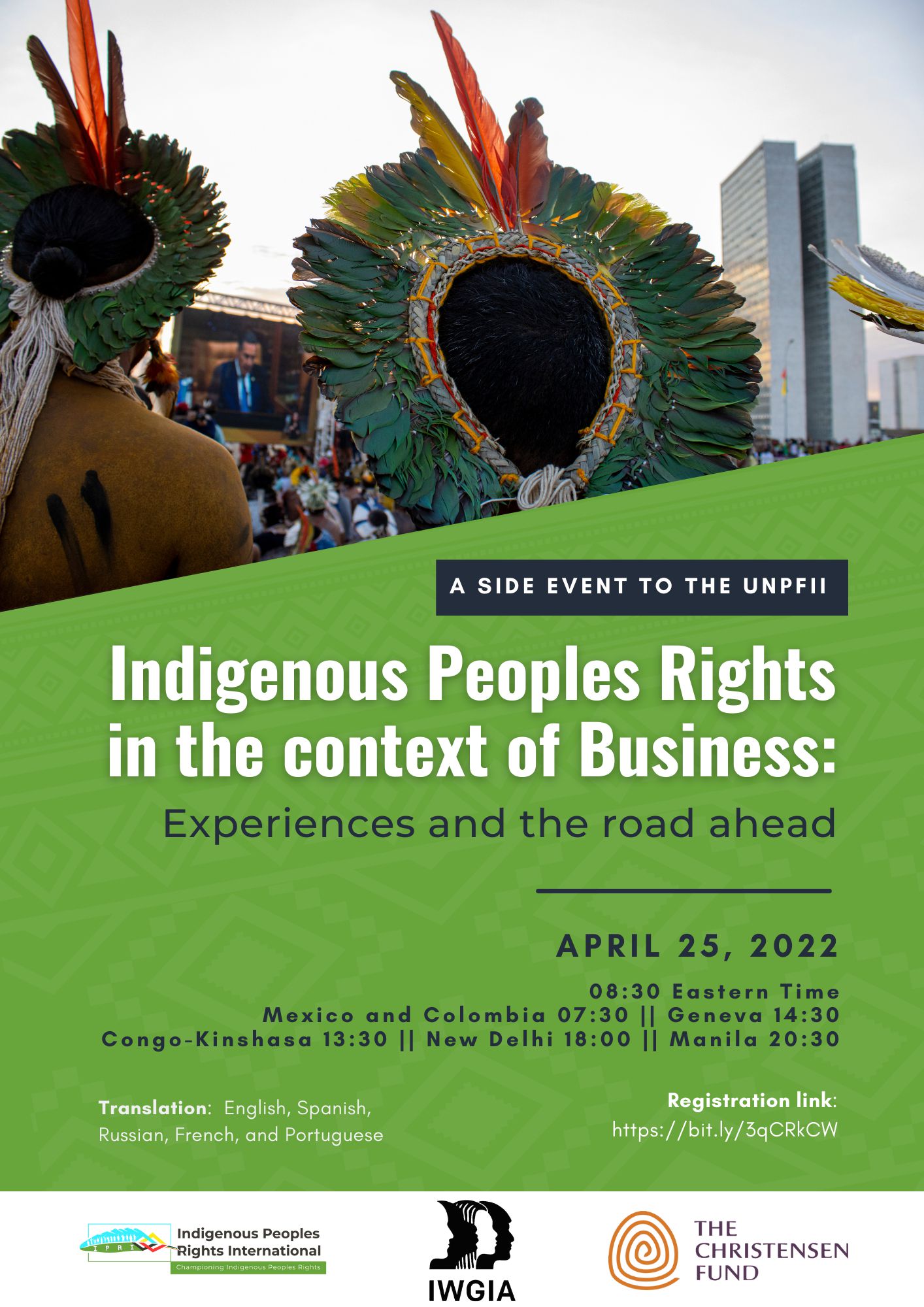Background
Indigenous Peoples throughout the world are affected by business activities on or close to their territories. Often, these activities are undertaken without due respect for Indigenous Peoples’ rights. In many cases, as peoples, communities and defenders oppose these projects and defend their collective and individual rights, they are victims to harassment, violence, criminalization and even death.
In 2021, the International Working Group on Indigenous Affairs and Indigenous Peoples Rights International published the report titled the “UN Guiding Principles on Business & Human Rights and Indigenous Peoples – Progress Achieved, the Implementation Gap and Challenges for the Next Decade.” As analyzed in the study, during the past decade, progress was made at the normative, policy and even judiciary level in relation to business and human rights. These developments have helped raise awareness and attention to the concerns of Indigenous Peoples. Nevertheless, several significant gaps were found. Throughout the world, Indigenous Peoples continue to be disproportionally affected by business activities. There is a historic gap in the recognition and enforcement of the right to self-determination, the right to lands, territories and resources and the right to Free, Prior and Informed Consent.
After a decade of implementation of the UN Guiding Principles on Business and Human Rights (UNGPs), the UN Working Group on Business and Human Rights developed the roadmap for the next decade of implementation of the UNGPs (UNGPs 10+).
This year, the UN Permanent Forum on Indigenous Issues (UNPFII) will discuss the theme “Indigenous peoples, business, autonomy and the human rights principles of due diligence including free, prior and informed consent”. This highlights the relevance and importance of these issues for Indigenous People in the context of business.
In addition, Indigenous Peoples Rights International (IPRI) in conjunction with various partners has undertaken a series of actions to raise awareness, do capacity building, develop tools, case studies and develop an Indigenous Roadmap for the next decade in processes related to business and Human Rights.
The side event “Indigenous Peoples Rights in the context of Business: Experiences and the road ahead” will provide an opportunity to present some cases of ongoing business operations affecting indigenous peoples in India, the Philippines, Mexico, and Russia. In addition, IPRI's ongoing work for the elaboration of the Indigenous Peoples Business and Human Rights Roadmap will be discussed.
Aims of the side-event
- To present and discuss specific experiences of indigenous peoples on the impacts to their rights by business activities;
- To present and discuss the Indigenous Peoples’ Business and Human Rights Roadmap;
- To provide an avenue for exchange and interaction between Indigenous Peoples and relevant actors in advancing the respect and protection of Indigenous Peoples’ rights on the ground in relation to business.
Agenda
Date: April 25, 2022
Time: 8:30 am – 10:20 am Eastern Time (New York time) (check your time here)
Location: Zoom. Register here
Translation: available in English, Spanish, Russian, French and Portuguese
Moderator: Ms. Lola Garcia-Alix, International Work Group for Indigenous Affairs/IWGIA
|
Time |
Activity |
|
10 min |
Welcome and introduction – Joan Carling |
|
5 min |
Opening remarks: Anne Nuorgam, Chairperson, UN Permanent Forum on Indigenous Issues |
|
40 min (5-7 minutes each speaker) |
Cases and Experiences: - Mexico: Colectivo Indignación and the pig farms in Yucatan - Philippines: Gened Dams in Kabugao, Apayao (Jillie Karl) - India: Impacts of Coal Mining on Indigenous Peoples (Dinesh Murmu) - Russia: Nornickel and Indigenous Peoples of Taimyr Dolgan-Nenets district (Pavel Sulyanziga) - Indonesia: Ancestral Domain Dispossession in Sebalos Hamlet |
|
15 min |
Reactors: - Ms. Fernanda Hopenhaym – Vice-Chair, UN Working Group on Business and Human - Rights Francisco Cali – UN Special Rapporteur on the Rights of Indigenous Peoples (TBC) |
|
5 min |
Indigenous Peoples Roadmap for the Second Decade of Implementation of the UNGP – Joan Carling |
|
10 min |
Q&A and Discussion |
|
5 min |
Closing remarks |
|
11 min |
Optional: Video of Indigenous Peoples and the UNGP |


